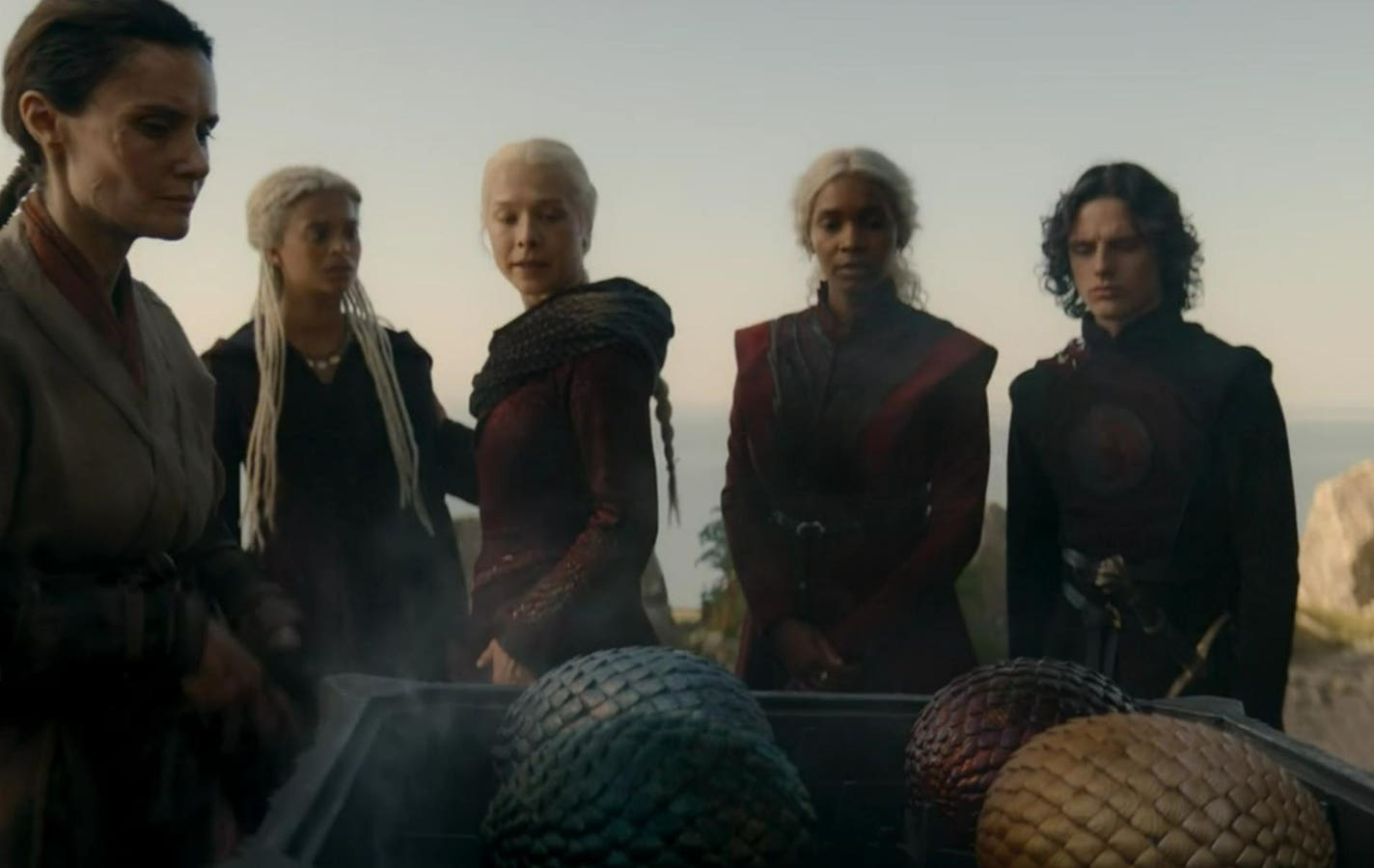There’s a pretty major, ahem, Easter Egg (or three) in the latest episode of House Of The Dragon on HBO. Spoilers ahead.
Part way through the third episode, “The Burning Mill,” Rhaenyra (Emma D’Arcy) sends her step-daughter, Rhaena (Phoebe Campbell) off to the Vale along with her youngest children. She’s to take them first to the Vale to Lady Jeyne Arryn and from there across the Narrow Sea to Pentos.
Pentos, you may recall, is where Daenerys (Emilia Clarke) was at the very beginning of Game Of Thrones when Master Illyrio Mopatis (Roger Allam) gives her a very special gift on the eve of her wedding to Khal Drogo (Jason Momoa): Three dragon eggs.
Along with her children and two fledgling dragons, Tyraxes and Stormcloud, Rhaena is to take another valuable cargo: Four dragon eggs—all of which may very well turn to stone once taken from Dragonstone. Three of these eggs look awfully familiar: One is gold, one green and the other a dark reddish-black. The fourth is a light blue.
When I saw this, I wondered if HBO was changing the story of how Daenerys got her eggs from the book Fire & Blood where it was strongly implied that the three eggs made their way to Pentos much earlier, during the reign of Rhaenyra’s grandfather, Jaehaerys I.
I did not mention that these could be Dany’s eggs in my review because my recollection of the book—which is correct by the way—was that those eggs were stolen from Jaehaerys I by a noblewoman named Elissa Farman, the lover of Princess Rhaena Targaryen (not Rhaena from this time period). When the two lovers’ relationship ended rather badly, Elissa stole the eggs and sailed across the sea to Braavos where she sold the eggs to the Sealord of Braavos, using the money she earned to pay for her later voyages.
The theory—it was never confirmed by George R.R. Martin, only heavily implied—was that these eggs made their way eventually to the wealthy Illyrio in Pentos and from him to Daenerys.
However, it appears the show is making a major (if completely understandable) change from the book. “Those are Daenerys’ eggs,” the episode’s director Geeta Vasant Patel told Mashable. “All of us who work on this show are big Game of Thrones fans, so it was very exciting to shoot that scene.”
Rhaena is at first bitter about being sent away, still stewing over her lack of a dragon (though there are four eggs, remember, and only three turn to stone and make it to Daenerys hundreds of years later). When Rhaenyra shows her the eggs and tells her they’re the hope for the Targaryen’s future—should war destroy them all, and their dragons, too—Rhaena realizes just how important her mission is, though sadly the preservation of these eggs ultimately ends in the deaths of thousands of innocents at the hands of the Mad Queen and Drogon.
Clearly, Rhaena’s story will take a much different course than in the book, though it’s possible she will still play the same role and some other character will steal the eggs from her instead of her great-grandfather. It works to tie this show directly to Game Of Thrones; after all, I doubt HBO will make another show about Jaehaerys I. He’s one of my favorite Targaryen kings, but if they do another Targaryen show it makes more sense to make one about Aegon the Conqueror and his exploits. Jaehaerys, after all, ruled over a time of great peace and prosperity. Where’s the fun in that?
Read my review of Episode 3 here. Watch my video review below:
Update 7/2/24
I write a lot about adaptations and why so many seem to fail. And not just adaptations, but also new entries in long-running franchises like Star Wars and The Lord Of The Rings, which seem to constantly disappoint fans (including me).
I discussed this recently in my newsletter, where I used this quotation from Fire and Blood author George R.R. Martin and what he thinks about writers and producers making big changes from the source material:
Everywhere you look, there are more screenwriters and producers eager to take great stories and “make them their own.” It does not seem to matter whether the source material was written by Stan Lee, Charles Dickens, Ian Fleming, Roald Dahl, Ursula K. Le Guin, J.R.R. Tolkien, Mark Twain, Raymond Chandler, Jane Austen, or… well, anyone. No matter how major a writer it is, no matter how great the book, there always seems to be someone on hand who thinks he can do better, eager to take the story and “improve” on it. “The book is the book, the film is the film,” they will tell you, as if they were saying something profound. Then they make the story their own.
They never make it better, though. Nine hundred ninety-nine times out of a thousand, they make it worse.
I think House Of The Dragon is one of the best examples out there of a show that makes pretty significant changes from the book but in ways that make a lot of sense. This dragon egg bit is a perfect instance of making a change that makes sense for audiences since we’ll probably never see the original story onscreen. Since Fire and Blood is a fake “history” that uses various unreliable narrators, hearsay and so forth, they’re able to make changes that work for the story but that leave the “historical” record the same. We’re meant to treat the show like “what really happened” whereas the book is more of a “what history tells us happened through the fog of time.”
And some of these changes I don’t love. Not getting to see the Battle of the Burning Mill was a shame, but the reality is these types of battles are incredibly expensive and time-consuming to shoot, and since this show is primarily about a civil war filled to the brim with battles—including aerial dragon battles—they have to budget for that. We’ll get battles, most certainly, but not every combat in Fire and Blood, which is a great reason that you should absolutely read the book! It’s really terrific.
Let me know your thoughts on Twitter, Instagram or Facebook. Also be sure to subscribe to my YouTube channel and follow me here on this blog. Sign up for my newsletter for more reviews and commentary on entertainment and culture.
Read the full article here





